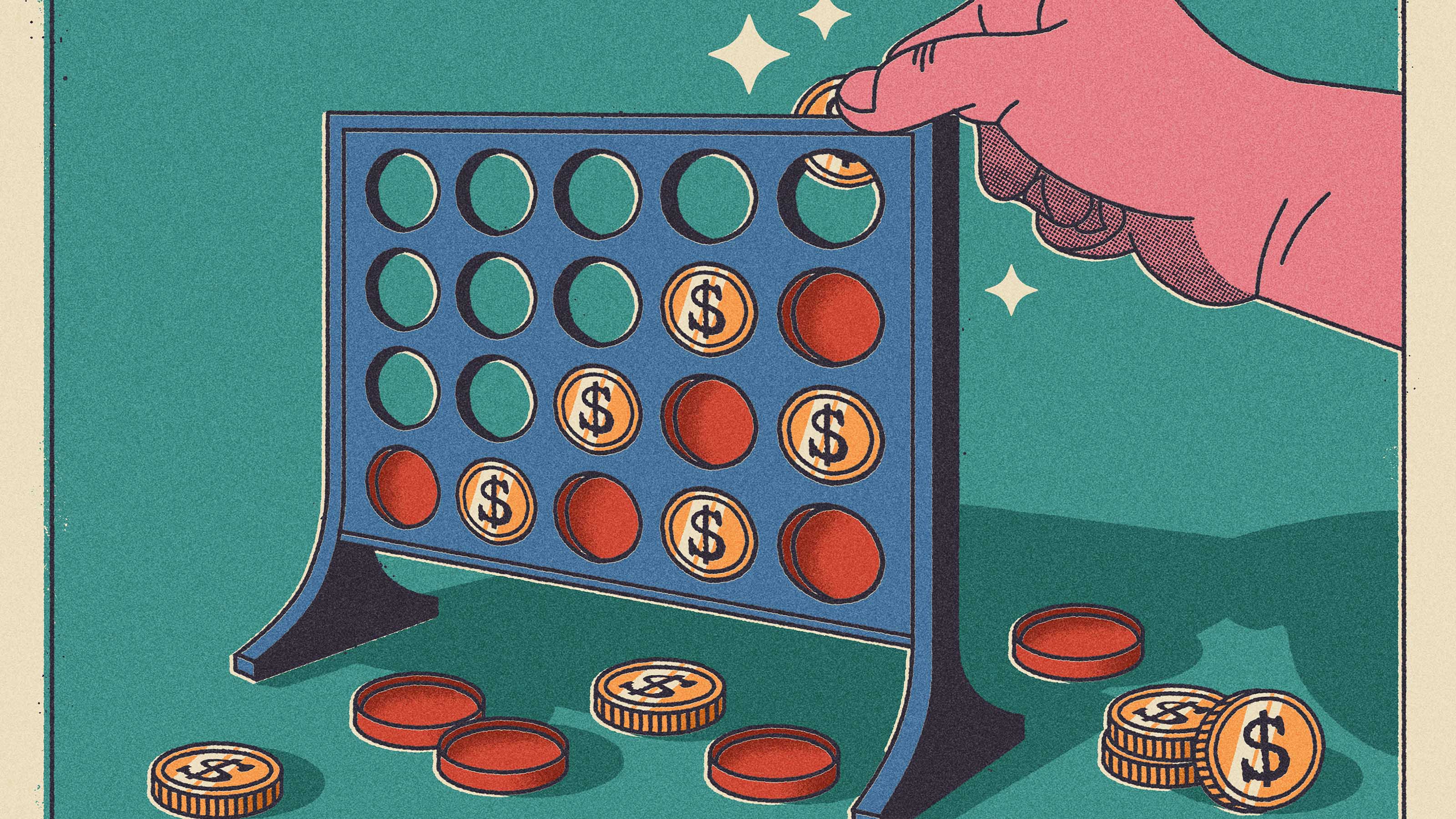The Upside of a Market Downturn
When share prices stumble, you can take advantage of buying opportunities.

Profit and prosper with the best of Kiplinger's advice on investing, taxes, retirement, personal finance and much more. Delivered daily. Enter your email in the box and click Sign Me Up.
You are now subscribed
Your newsletter sign-up was successful
Want to add more newsletters?

Delivered daily
Kiplinger Today
Profit and prosper with the best of Kiplinger's advice on investing, taxes, retirement, personal finance and much more delivered daily. Smart money moves start here.

Sent five days a week
Kiplinger A Step Ahead
Get practical help to make better financial decisions in your everyday life, from spending to savings on top deals.

Delivered daily
Kiplinger Closing Bell
Get today's biggest financial and investing headlines delivered to your inbox every day the U.S. stock market is open.

Sent twice a week
Kiplinger Adviser Intel
Financial pros across the country share best practices and fresh tactics to preserve and grow your wealth.

Delivered weekly
Kiplinger Tax Tips
Trim your federal and state tax bills with practical tax-planning and tax-cutting strategies.

Sent twice a week
Kiplinger Retirement Tips
Your twice-a-week guide to planning and enjoying a financially secure and richly rewarding retirement

Sent bimonthly.
Kiplinger Adviser Angle
Insights for advisers, wealth managers and other financial professionals.

Sent twice a week
Kiplinger Investing Weekly
Your twice-a-week roundup of promising stocks, funds, companies and industries you should consider, ones you should avoid, and why.

Sent weekly for six weeks
Kiplinger Invest for Retirement
Your step-by-step six-part series on how to invest for retirement, from devising a successful strategy to exactly which investments to choose.
When I make plans and execute them, they may or may not work out. When I neglect my portfolio, it’s usually a winning move.
Consider, for instance, what happened with AV Homes. My plan was to convert my shares in the residential development company into shares of Taylor Morrison Home Corp. (symbol TMHC, $16), which had proposed a buyout that gave AV Homes investors the choice of taking all cash, all stock, or part stock and part cash. I was waiting for the prospectus that would spell out the tax implications and other details.
But as often seems to be the case these days, the prospectus arrived when I was in the middle of doing something else. This time, I was packing for vacation. For a few dark moments, I contemplated taking the inch-thick prospectus on the plane with me to Peru. I could read it on the flight, I thought. Then my rational mind kicked in and said, Yes, but you could also watch a movie or read a book, which sounds much more enjoyable and vacation-like.
From just $107.88 $24.99 for Kiplinger Personal Finance
Become a smarter, better informed investor. Subscribe from just $107.88 $24.99, plus get up to 4 Special Issues

Sign up for Kiplinger’s Free Newsletters
Profit and prosper with the best of expert advice on investing, taxes, retirement, personal finance and more - straight to your e-mail.
Profit and prosper with the best of expert advice - straight to your e-mail.
The prospectus remained on the dining room table. Instead, I read the book selected by my book club: Ghost Soldiers, a historical account of a daring rescue of American prisoners of war in the Philippines during World War II. (I highly recommend it.)
I justified setting the prospectus aside by reminding myself that I would be back in early September, which gave me plenty of time to read it before the annual meeting. But when I got home, I had work to catch up on and friends to see. My niece had a baby, and I went on a business trip. In short, life intervened. The prospectus got buried under a pile of junk mail.
The default option. Then one day I noticed that there was a bunch of additional cash—$12,647 to be precise—in the Practical Investing portfolio. And instead of AV Homes shares, I had 403 shares of Taylor Morrison. What happened? I got the default selection of roughly four-tenths of a Taylor Morrison share plus $12.64 for each AV share I owned.
Coincidentally, the market took a deep dive at almost the same point, and those Taylor Morrison shares I was willing to pay $21.50 for a few months earlier were now selling for less than $16. Now the question was: Should I use the $12,647 in AV Homes proceeds to buy Taylor Morrison shares, as I originally intended? After all, if I thought the shares were reasonably priced at $21.50, I should be champing at the bit to buy them now.
Of course, it’s never that easy. When you look at a stock that’s down 26% from when you last considered buying it, you ask yourself, What does the market know that I don’t know? Sure, part of the market’s sudden skittishness is about rising interest rates. Rising rates make houses less affordable. At a 4% interest rate, the monthly payment on a $250,000, 30-year mortgage is $1,194. But if rates were to pop up to 6%, that $250,000 mortgage would cost you almost $1,500 per month.
Rising rates also hit the supply side of the equation, tamping—and, eventually, stamping—down housing prices. Lower demand and lower housing prices would be bad for Taylor Morrison. I think we’re a long way from that stage of the cycle, though. Employment is strong, and wages are rising—a situation that is generally good for housing. I also still like Taylor Morrison as a company. So, the day before Taylor Morrison reported quarterly results, I bought 820 shares for $15.73 a share.
It’s a little risky to buy on earnings eve. But I expected earnings to be good and the stock to rise in response, which actually did happen. I wanted the bargain price, so I had to move quickly. This month, I guess I can chalk up a win in the “plan and execute” column, too.
Profit and prosper with the best of Kiplinger's advice on investing, taxes, retirement, personal finance and much more. Delivered daily. Enter your email in the box and click Sign Me Up.

-
 Over 65? Here's What the New $6K 'Senior Deduction' Means for Medicare IRMAA Costs
Over 65? Here's What the New $6K 'Senior Deduction' Means for Medicare IRMAA CostsTax Breaks A new deduction for people over age 65 has some thinking about Medicare premiums and MAGI strategy.
-
 U.S. Congress to End Emergency Tax Bill Over $6,000 Senior Deduction and Tip, Overtime Tax Breaks in D.C.
U.S. Congress to End Emergency Tax Bill Over $6,000 Senior Deduction and Tip, Overtime Tax Breaks in D.C.Tax Law Here's how taxpayers can amend their already-filed income tax returns amid a potentially looming legal battle on Capitol Hill.
-
 5 Investing Rules You Can Steal From Millennials
5 Investing Rules You Can Steal From MillennialsMillennials are reshaping the investing landscape. See how the tech-savvy generation is approaching capital markets – and the strategies you can take from them.
-
 The Most Tax-Friendly States for Investing in 2025 (Hint: There Are Two)
The Most Tax-Friendly States for Investing in 2025 (Hint: There Are Two)State Taxes Living in one of these places could lower your 2025 investment taxes — especially if you invest in real estate.
-
 The Final Countdown for Retirees with Investment Income
The Final Countdown for Retirees with Investment IncomeRetirement Tax Don’t assume Social Security withholding is enough. Some retirement income may require a quarterly estimated tax payment by the September 15 deadline.
-
 How to Beef Up Your Portfolio Against Inflation
How to Beef Up Your Portfolio Against Inflationinvesting These sectors are better positioned to benefit from rising prices.
-
 Taxable or Tax-Deferred Account: How to Pick
Taxable or Tax-Deferred Account: How to PickInvesting for Income Use our guide to decide which assets belong in a taxable account and which go into a tax-advantaged account.
-
 Smart Investing in a Bear Market
Smart Investing in a Bear Marketinvesting Here's how to make the most of today’s dicey market.
-
 How to Open a Stock Market Account
How to Open a Stock Market Accountinvesting Investing can be fun, but you need a brokerage account to do it. Fortunately, it’s easy to get started.
-
 The Right Dividend Stock Fund for You
The Right Dividend Stock Fund for YouBecoming an Investor Dividend stock strategies come in many different flavors. Here's what to look for.
-
 Alternative Investments for the Rest of Us
Alternative Investments for the Rest of UsFinancial Planning These portfolio diversifiers aren't just for the wealthy.